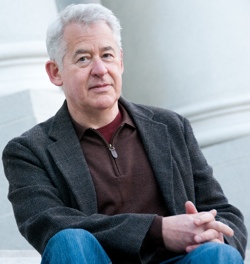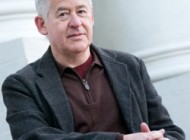Perhaps as a result of the recent appearance of the movie Trumbo, a portrayal of screenwriter Dalton Trumbo’s struggles with the House Un-American Activities Committee, there’s renewed public interest in the phenomenon of the Hollywood blacklist. Many who knew nothing of that period, including the very fact of its existence, have become curious about how it could have happened and how it worked.
But to those of us who experienced it first-hand, it’s a familiar story. My father, Frank Tarloff, was among the screenwriters blacklisted for his political beliefs. Subpoenaed in 1953 and, like Trumbo, refusing to testify, he was subsequently unable to work under his own name for over a decade. Our family re-located to England for a number of years simply so he could find employment.
Many years later, toward the end of his life, Frank taught screenwriting at USC, and during that period he chaired a committee organized to erect a monument on the university campus dedicated to the victims of the blacklist. The monument, designed by New York artist Jenny Holzer, was unveiled in 1999. Ordinarily, Frank would have spoken at the unveiling ceremony, but since he had died earlier that year, the committee invited me to speak in his stead. Somehow, and not only because of Trumbo, it all feels relevant again.
These were my remarks:
There are painful, instructive ironies at the heart of the historical period we’re commemorating today.
Now, it’s not necessary to be a saint in order to be a victim. Or even in order to be a martyr. If you’re treated in a bullying, unjust manner by those who have more power than you, you’ve earned the right to feel victimized. And if you refuse to knuckle under to that sort of bullying despite the punishment you know lies in store, then you deserve to be regarded as a martyr.
The men and women who were blacklisted would no doubt have plenty to disagree about were they to assemble today. But that’s no surprise; from the start, contentiousness was their stock in trade. That’s one of the ironies I was alluding to. Adherents, many of them, to a philosophy that discouraged dissension, even outlawed it, these people were the least plausible Communists imaginable. I grew up watching my father and his pals play gin rummy. Believe me, anything resembling party discipline was entirely beyond their reach.
But still, many of them were Communists, or at least believed themselves to be. I make the latter distinction because my friend, Zach Leader, once asked my father when he had read Karl Marx. And Frank, after looking at Zach incredulously for a moment — read Karl Marx? Had Zach lost his mind? — when Frank got over his surprise at the question, he said, “Never. No one could read that shit. We made our communism up as we went along.”
Nevertheless, I think it’s important to acknowledge that for all the blacklist victims who were falsely accused of being members of the Party, a good many more really had been.
It’s important to acknowledge this because, otherwise, you’re implicitly granting the Committee’s right to investigate a citizen’s politics, you’re ceding them their fundamental political premise, you’re just complaining that they sometimes did sloppy work.
One of the many things these former Party members might fight about fiercely today is the question of whether they were largely right or largely wrong in their political choices. Not whether they were well-intentioned; suffering through the depths of the Depression, with militant Fascism on the rise in Europe, it’s impossible to doubt that their intentions were noble. But I think there would still be plenty of heated disagreement among them about whether, given the temper of the times, they had done the right thing by joining the Communist Party. Actually, I don’t just think it. I know it. I grew up watching my father and his friends engage in many heated debates over just this issue. One time, things got so bellicose several people actually choked on their corned beef.
Now, remember, all of these people had left the Party years before. They had de-Stalinized well in advance of the 20th Party Congress, they had washed their hands of the whole business. But some now believed that, with the best intentions in the world, they had unwittingly allied themselves with an evil ideology. Whereas others believed that if you were indignant about Jim Crow laws, alarmed by 25% unemployment, and terrified by what was happening in Italy and Spain and Germany, then the Communist Party was the only game in town.
But when it comes to the crux of what happened during the McCarthy era, I don’t think the answer to this other argument matters. At all. And as I’ll explain in a moment, I know I’m also speaking for my father when I say this.
In 1984, George Orwell defined freedom as the right to say two plus two make four. Well, this may be presumptuous of me, but I think that’s far too restrictive a definition. In fact, I think freedom is the right to say two plus two make five. Freedom, at least in part, is the right to be wrong. Notions of right and wrong change all the time, after all, but freedom of conscience — the freedom to doubt and question the prevailing orthodoxy, even in deluded or stupid ways — should be a constant.
How do I know I speak for my father as well as myself on this matter? Because I remember, back in the 1970s, that the American Nazi Party wanted to stage a march through Skokie, Illinois. A number of people sought to get an injunction preventing the march. And the ACLU went to court on behalf of the Nazis. A great many people, good liberals all of them, were outraged, and thereupon withheld their financial support from the organization.
Not Frank. Frank sent them an extra check. If you knew Frank, you would know how big a gesture that is. But for him, the First Amendment wasn’t a matter of defending free speech only when it was speech he agreed with, or when it was his ox that was being gored. His belief in free speech was close to absolute. His belief in the exercise of one’s individual conscience, regardless of how misguided, was unequivocal.
I began by referring to some painful, instructive ironies associated with the issue of blacklisting. To me, the central irony is this: Some of the people we’re commemorating today — not all, but some — really did advocate the overthrow of the American government. And at the same time, the men in charge of the political inquisitions that investigated them felt no hesitation about styling themselves the Committee on Un-American Activities.
And yet, if one believes in the Bill of Rights, if one values the First Amendment to the Constitution, one would have to say, along with Harry Truman, that the Un-American Activities Committee was the most un-American thing in America. And one would also have to say that these people who were accused of Un-American activities, these people who were accused of treachery and were offered expiation in exchange for throwing their friends to the wolves; these victims, these martyrs, nevertheless had the courage to maintain, at great personal sacrifice, a vital American principle.
And so it is as American heroes that we honor them today.
Tags: 1984 Bill of Rights Committee on Un-American Activities communism Dalton Trumbo erik Tarloff First Amendment Frank Tarloff George Orwell Harry Truman Hollywood Blacklist Marx McCarthy screenwriting Stalin Trumbo USC









0 Comment